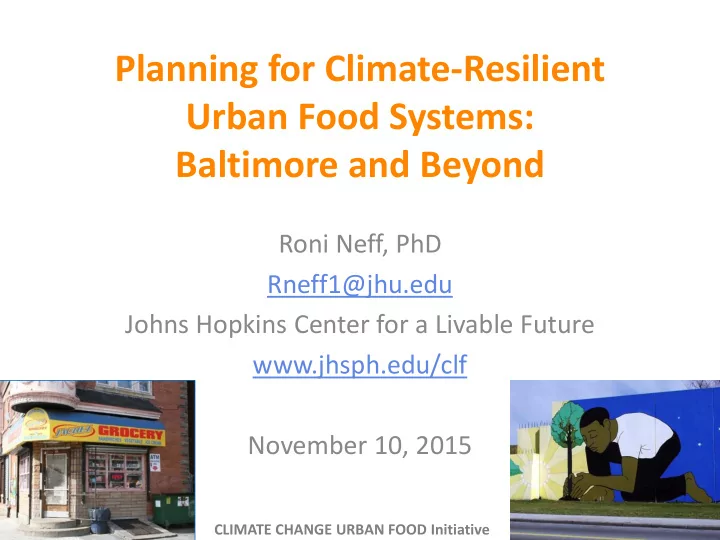

Planning for Climate-Resilient Urban Food Systems: Baltimore and Beyond Roni Neff, PhD Rneff1@jhu.edu Johns Hopkins Center for a Livable Future www.jhsph.edu/clf November 10, 2015 CLIMATE CHANGE URBAN FOOD Initiative
Defining Resilience Not: Sustainability Emergency Response Food security The ability to absorb, respond to, recover from and adapt more successfully to adverse events (IOM) Source: COPE-WELL Project CLIMATE CHANGE URBAN FOOD Initiative
CLIMATE CHANGE URBAN FOOD Initiative
https://s-media-cache- ak0.pinimg.com/736x/4a/ba/92/4aba9270c27978c5ec9e7a6c1ea27ef3.jpg CLIMATE CHANGE URBAN FOOD Initiative
Assets • Disaster Preparedness and Planning Project • Baltimore Food Policy Initiative – 60+ food system stakeholders – Mayoral support – Food system innovation • City-university partnership CLIMATE CHANGE URBAN FOOD Initiative
Baltimore Food System • 23% food insecure • 25% in food deserts • 19-year life expectancy gap CLIMATE CHANGE URBAN FOOD Initiative
Baltimore Uprising CLIMATE CHANGE URBAN FOOD Initiative
CLIMATE CHANGE URBAN FOOD Initiative
Key Vulnerabilities Revealed in Uprising • No coordinated system for response – Need food- related “chain of command” and procedures; incorporate into emergency operations – System for organizing food requests, donations • Protections for retail, food delivery – Curfew hindered deliveries • Loss of $ for businesses on tight margins CLIMATE CHANGE URBAN FOOD Initiative
Food System Resilience Plan - 1 With Baltimore Office of Sustainability, Food Policy Initiative • Community engagement • Review other food plans (28); emergency plans (18) • Background – Overview of city food system – Mapping/inventory assets – Connections to other city plans • Existing hazard mitigation – Interviews with food system stakeholders CLIMATE CHANGE URBAN FOOD Initiative
Food System Resilience Plan -2 HAZARD ASSESSMENT VULNERABILITY ASSESSMENT • Flooding and coastal hazards • Damage to buildings • Precipitation variability and • Loss of electricity, extreme heat telecommunications, Internet • Wind • Damage to transport • Civil unrest networks within/outside city • Terrorism and cyber attack • Food or resource • Pandemic shortages/price rises • Food contamination • Worker/resident inability to or fear of travel CLIMATE CHANGE URBAN FOOD Initiative
CLIMATE CHANGE URBAN FOOD Initiative
Food System Resilience Plan – 3 Emergency Preparedness • Procedures, contacts • Collaboration/communication between city agencies, community organizations, businesses • Enhancing existing efforts • Prioritize food; security for food stores • Info for communities – food access, food safety • Emergency food/water sites • Regional cooperation CLIMATE CHANGE URBAN FOOD Initiative
Food System Resilience Plan – 4 Strategies, Actions • Strategies and actions • “No regret” actions – Strengthen food access – Food recovery – Support for renewable energy – Strengthen local/regional food supply • Implementation, maintenance, evaluation CLIMATE CHANGE URBAN FOOD Initiative
Beyond Baltimore • Developing indicators for urban food system pre-event functioning /preparedness • Share framework • Networking beyond Baltimore CLIMATE CHANGE URBAN FOOD Initiative
Thanks • Kristin Baja, Baltimore City Office of Sustainability • Holly Freishtat and Alice Huang, Baltimore City Food Policy Initiative • Other partners: Daniel Barnett, PhD, Judith Mitrani-Reiser, PhD, Juliana Vigorito, Diana Reighart, Lauren Walsh, Lindsay Beattie • Funding: Johns Hopkins Center for a Livable Future (www.jhsph.edu/clf ); 21 st Century Cities Fund – Johns Hopkins University CLIMATE CHANGE URBAN FOOD Initiative
Johns Hopkins Center for a Livable Future www.jhsph.edu/clf CLIMATE CHANGE URBAN FOOD Initiative
Main messages 1. Resilience: the ability to absorb, respond to, recover from and adapt more successfully to adverse events (IOM) 2. Food systems are vulnerable; resilience planning is a must. 3. Resilience planning: Community engagement, assess hazards/vulnerabilities, emergency planning, strategies, ACTION, evaluation. CLIMATE CHANGE URBAN FOOD Initiative
Recommend
More recommend